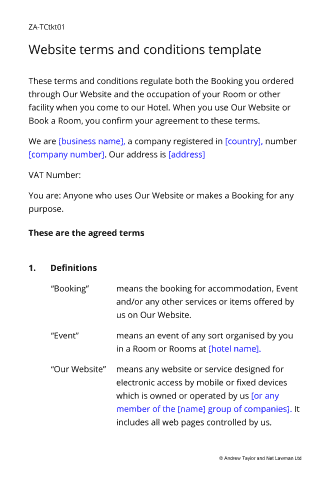Website terms and conditions template

Document overview


- Length:10 pages (2400 words)
- Available in:
 Microsoft Word DOCX
Microsoft Word DOCX Apple Pages
Apple Pages RTF
RTF

If the document isn’t right for your circumstances for any reason, just tell us and we’ll refund you in full immediately.

We avoid legal terminology unless necessary. Plain English makes our documents easy to understand, easy to edit and more likely to be accepted.

You don’t need legal knowledge to use our documents. We explain what to edit and how in the guidance notes included at the end of the document.

Email us with questions about editing your document. Use our Lawyer Assist service if you’d like our legal team to check your document will do as you intend.

Our documents comply with the latest relevant law. Our lawyers regularly review how new law affects each document in our library.
About this terms and conditions template
This terms and conditions template is suitable for a hotel that takes some bookings on its website. The hotel may offer other services in addition to rooms, such as venue hire, business meeting facilities, and leisure facilities (spa treatments, swimming pools, gyms). It can be customised easily to reflect how your business operates.
Your terms and conditions are the contract between you and your guests. Unless you set out your terms clearly, you leave your business open to guests overstepping boundaries (such as check-in and check-out times) and to complaints that unrealistic service levels were not met.
Of course, even the most well written T&C aren't going to prevent difficult customers finding something to grumble about, but they should protect you from more serious claims that you haven't provided the level of service that your guests expected.
Presentation and use of plain language
In the hotel and leisure industry many contractual terms are also part of the explanation of what is provided, and how and where and when (for example, what is included in the price of a room, or how a customer can cancel a reservation). We have followed the industry practice of presenting the terms in a style that does to look like a legal document and that does not use legal jargon.
That does not mean that the legal effect is in any way diminished. Clear, concise terms written in plain English will benefit your business far more than a verbose document written in legalistic language. Guests are more likely to book and stay with you because:
- you set their expectations in advance as to what their stay will be like
- the tone of your terms is friendly and welcoming rather than intimidating
- the professionalism reflected in your terms is likely to be extended across other areas of your business
- they understand the rules of staying with you (particularly important in a business where many of your customers are unlikely to be native speakers)
The terms themselves have been written for placement on your website. We assume that your guests will read and accept them just before confirming a booking (or giving their card details, if you take this information online). They can equally be adapted for print.
Alternative templates
We sell another set of terms and conditions for hotels that don't offer additional services, and for bed and breakfast businesses. You may be interested to look at: Website terms and conditions template: bed and breakfast business.
If you are in any doubt as to which template you should choose, please contact us.
The law in this document
The law in these T&C is largely common law that deals with the basics of contracts: offer, acceptance, price and payment, provision of service, liabilities and risk. That means that, by and large, you can set the commercial terms you want. Our guidance notes will tell you what you can change safely, and what we don't advise changing.
Document contents
The terms and conditions template includes provisions that cover:
- Contract: formed on the acceptance of the hotelier rather than on payment;
- Security of credit card payment;
- Price and payment method;
- Reservation and cancellation;
- Arrival and departure;
- Minimum contractual position;
- Restrictions on the actions of guests during a stay;
- Event management;
- Disclaimers and limitation of liability;
- Indemnity;
- Other miscellaneous legal provisions.
It would be impractical to set out the terms of each service in full detail in this document (such as use of the swimming pool). This document provides for the situation that you set out the rules of use of services in more detail in some other way (such as on notices around the hotel).

Choose the level of support you need
Document Only
This document
Detailed guidance notes explaining how to edit each paragraph
Lawyer Assist
This document
Detailed guidance notes explaining how to edit each paragraph
Unlimited email support - ask our legal team any question related to completing the document
- Review of your edited document by our legal team including:
- reporting on whether your changes comply with the law
- answering your questions about how to word a new clause or achieve an outcome
- checking that your use of defined terms is correct and consistent
- correcting spelling mistakes
- reformatting the document ready to sign
All rights reserved
